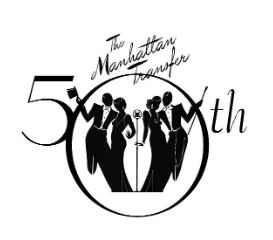
Manhattan Transfer March 30 concert in Westbury aids Long Island Cares
Vocal quartet Manhattan Transfer has earned the appreciation of their musical peers over the course of half a century, earning 10 Grammys and induction into the VocalGroup Hall of Fame in 1998.
The group garnered acclaim for its innovative arrangements of pop and jazz standards. It has drawn a dedicated, multi-decade fan base, with 10 of their albums making the top 10 in the Billboard Jazz charts, including a number one with Swing (1997). They have appeared on stage/recorded with A-listers such as Tony Bennett, Bette Midler, Smokey Robinson, Laura Nyro, Phil Collins, B.B. King, Chaka Khan, James Taylor and Frankie Valli.

Their 50th anniversary farewell tour will bring the quartet to The Space at Westbury on Thursday, March 30 at 8 p.m. It will benefit Long Island Cares–The Harry Chapin Food Bank.
The Long Island Weekly spoke with Trist Curless, a baritone/soprano who replaced founding member Tim Hauser in 2014, following the latter’s death. He will be joined by Janis Siegel and Alan Paul, who were recruited by Hauser back in 1972, along with Cheryl Bentyne, who replaced Laurel Massé in 1979.
Curless, 51, observed, “I was a fan [of the group] for most of my life, and then I was a part of it.”
He has been involved with two recordings, The Junction (2018) and Fifty (2022), a retrospective. One of his contributions to the former is an arrangement of XTC’s “The Man Who Sailed Around His Soul.”
Q: How would you describe your music to someone who has not heard of or heard the group?
 A: I would say it is infusing four-part harmony in as many styles of music as possible, largely jazz and pop musics, and exploring harmony in those. A lot of times it’s either replicating the old vocal groups from the big band era or emulating an entire sax section from the big bands.
A: I would say it is infusing four-part harmony in as many styles of music as possible, largely jazz and pop musics, and exploring harmony in those. A lot of times it’s either replicating the old vocal groups from the big band era or emulating an entire sax section from the big bands.
Q: Can you describe how you joined the group, first replacing and then succeeding [founder] Tim Hauser?
A: About a year before he passed away he had a surgery that left him unable to tour for a while. [The remaining members] reached out to people they knew in the business. It’s a very specialized thing. It’s not something you just post online or on Craigslist. You look for other companies or other people doing what you do. I was recommended by some other people in the field who understood my ability to possibly do it. And that was it. It wasn’t even really like an audition. It was like, “Okay, we trust your recommendation.” I had been singing with my own vocal group for about 20 years, called M-Pact. It was a six-person a cappella group doing jazz and R&B, a similar style [to Manhattan Transfer].
Curless went on tour with the quartet for about six months. Then, after Hauser died of cardiac arrest in October, 2014, Curless was announced as the replacement.
Q: When you get together to arrange songs, is it a collaborative effort? Does everybody have input?
A: While that can happen occasionally, it’s more often that one one person will basically take the lead or have the ideas and gets together with the producer of the album. While the concept of everybody all putting their ideas together sounds interesting and artistic, frankly, that just takes way more time. You could still get good results, but it would take forever. Sometimes it’s just more efficient to take somebody’s idea.
Q: Have the last two releases been on CD? That era seems to be over.
A: They are available on all the streaming platforms. While the CD has waned, there were physical CDs released worldwide and we still do carry them on tour. A lot of times, people like taking a tangible thing, especially if we’ve signed them.
Q: Is your fan base getting younger?
A: What helps is that the fans have been around throughout the history of the group. It’s nice that you see them bringing relatives, bringing their kids. Plus, the music of the Manhattan Transfer has been a staple in high school and college vocal programs for many years. So there are students that are excited to come and see the origins of what they studied and performed.
Q: Do you have musical training? Did your parents make you learn the piano?
 A: I kind of wish they had forced me to practice more, to be honest. I’m not great at the piano, just know enough to learn my parts. I grew up in Cheyenne, Wyoming and was fortunate enough to have some great music teachers that helped me see that I could take something that was just a hobby I enjoyed very much and understand that I could do [more with it]. So I did study in high school and in college as well.
A: I kind of wish they had forced me to practice more, to be honest. I’m not great at the piano, just know enough to learn my parts. I grew up in Cheyenne, Wyoming and was fortunate enough to have some great music teachers that helped me see that I could take something that was just a hobby I enjoyed very much and understand that I could do [more with it]. So I did study in high school and in college as well.
Q: Plenty of people can read music, but aren’t necessarily creative. Have you been able to use your musical knowledge?
A: It’s been helpful to develop those skills, the ability to read and understand the printed music. But it’s not really 100 percent necessary to create. I’ve expanded my ability to do things by ear without necessarily reading [sheet music]. But being able to read gives me the opportunity if someone wants to hire me for a studio session and I need to read. So it’s just good to have both. They’re all tools for the toolbox.
The 8 p.m. show at The Space at Westbury also features comedian Bobby Collins. The venue is at 250 Post Ave., Westbury. Tickets are on sale here. Prices range from $65 to $175.
Praising The Group
“When it comes to vocal power, the Manhattan Transfer set the bar.” — Dallas Morning News
“…the harmonies are stunning, and the basic sound sets a standard by which other jazz groups must be compared.” — Chicago Tribune
“They wear a ferocious musical intelligence and erudition on their elegant sleeves… they are masters of vocalese” — London Jazz News
“These four singers swing as hard and blend their voices as exquisitely today as they did on their 1970s debut album.” — Austin Chronicle
“Apart from swing, jazz, pop, and bebop, they specialize in incredibly fancy vocal deliveries — BMA Magazine
About Long Island Cares
Founded in 1980 by Grammy award-winning singer/songwriter and social activist Harry Chapin, Long Island Cares’ mission is to both provide nutritious, culturally relevant food to 230,000 food-insecure Long Islanders (including 68,000 children) and attack the root causes of hunger. It annually distributes more than 10 million pounds of food to more than 300 pantries, soup kitchens, shelters, senior-living facilities, homeless camps and more. Food is also distributed at six satellite locations, targeting each area’s underserved communities. As Harry Chapin said, “To know is to care, to care is to act, to act is to make a difference.” Long Island Cares exists to make those words a reality.
Learn more at https://www.licares.org.


















